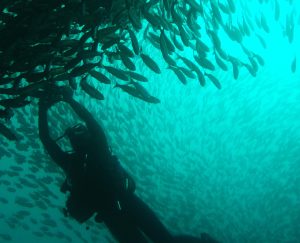Oceans are at the base of all our environmental and ecological systems. The health of the oceans determines the health of the rest of our planet. Resource extraction, climate change, pollution, and invasive species stress marine systems and threaten the future of our oceans’ well-being. The lack of effective governance and social institutions present challenges for ocean conservation and sustainability.
Our projects include topics in:
- Marine Ecology
- Physical & Biological Oceanography
- Fisheries
- Coastal & Marine Life
Marine ecology faculty and students study habitats, populations, and interactions among marine organisms and their environments in the near-shore and protected waters of the Galapagos Marine Reserve. As the fourth largest marine reserve worldwide, and the site of converging warm and cold oceanic currents on the equator, the marine environments of Galapagos are unusually diverse habitats of permanent and migrating vertebrate, invertebrate, mammalian, and avian communities. Our marine ecology researchers investigate mapping/modeling of marine ecosystems, biodiversity and biogeography, communities and endemism, habitat dynamics, population distribution and dynamics, migration and environmental change, and bio-acoustics.
Watch the video below to see how our researchers study the effects of an El Niño event on ocean life:
Research Projects

Impacts of Ocean Change on the Galapagos Marine Ecosystem
People: Adrian Marchetti, Harvey Seim, and Scott Gifford
Departments: Marine Sciences

Modeling Fisheries in the Galapagos Islands
People: Steve Walsh, Kim Engie, Phil Page, and Brian Frizzelle
Departments: Geography
